
David Martin Scott Steel, Baron Steel of Aikwood, is a retired Scottish politician. Elected as Member of Parliament for Roxburgh, Selkirk, and Peebles, followed by Tweeddale, Ettrick, and Lauderdale, he served as the final leader of the Liberal Party, from 1976 to 1988. His tenure spanned the duration of the alliance with the Social Democratic Party, which began in 1981 and concluded with the formation of the Liberal Democrats in 1988.
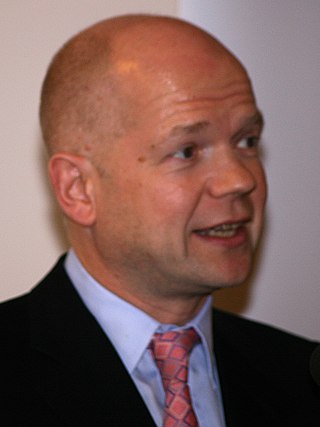
The Shadow Cabinet appointed by Conservative Party leader William Hague was the Official Opposition Shadow Cabinet from 1997 to 2001. Following his initial appointments in June 1997, Hague reshuffled the Shadow Cabinet five times before his resignation as leader following defeat in the 2001 general election.
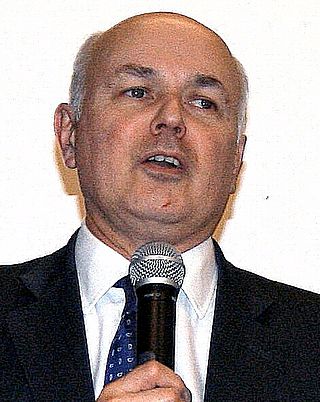
The UK Shadow Cabinet was appointed by Conservative Party leader Iain Duncan Smith. Following his initial appointments in September 2001 Smith managed three reshuffles before his resignation as leader in November 2003.

The 1997 Prime Minister's Resignation Honours were officially announced in two supplements to The London Gazette of 1 August 1997 and marked the May 1997 resignation of the Prime Minister, John Major.
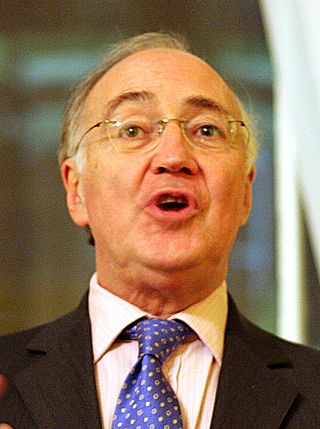
The Shadow Cabinets appointed by Michael Howard, a Conservative, are listed below.
The list that follows is the Liberal Democrats Frontbench Team/Shadow Cabinet led by Menzies Campbell from 2006 to 2007.
The list that follows is the Liberal Democrats Frontbench Team/Shadow Cabinet led by Charles Kennedy, who was Party leader from 1999 to 2006. The Party began to refer to its Frontbench Team as a Shadow Cabinet during Kennedy's tenure as leader.
The list that follows is the Liberal Democrats Frontbench Team/Shadow Cabinet led by Vince Cable, who was acting leader between 15 October and 18 December 2007, following the resignation of Menzies Campbell and prior to the election of Nick Clegg.
Members of the British Liberal Party's Frontbench Team from 1956 to 1967 :
Members of the British Liberal Party's Frontbench Team from 1967 to 1976 :
The list that follows is the Liberal Democrats frontbench team led by Paddy Ashdown, who was party leader from 1988 to 1999. Initially known as a frontbench team, the Lib Dems began to refer to their Frontbench Team as a "Shadow Cabinet" during the leadership of Ashdown's successor, Charles Kennedy, although the use of the term is controversial.

John Smith was Leader of the Labour Party and Leader of the Official Opposition from 18 July 1992 until his death on 12 May 1994. Smith became leader upon succeeding Neil Kinnock, who had resigned following the 1992 general election—for the fourth successive time, the Conservatives had won and Labour lost.

Neil Kinnock was Leader of the Labour Party and Leader of the Opposition from 2 October 1983 to 18 July 1992. He convincingly defeated Roy Hattersley, Eric Heffer, and Peter Shore in the 1983 leadership election, which was prompted by Michael Foot's resignation following the disastrous general election result earlier that year. Kinnock's period as Leader encompassed the bulk of the Thatcher premiership and the first two years of the Major premiership. Kinnock resigned in 1992 after losing his second election as Leader.
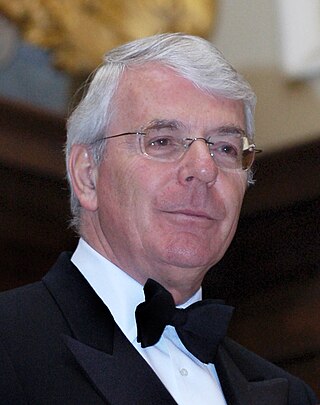
The 1992 Dissolution Honours List was gazetted on 5 June 1992 following the advice of the Prime Minister, John Major.
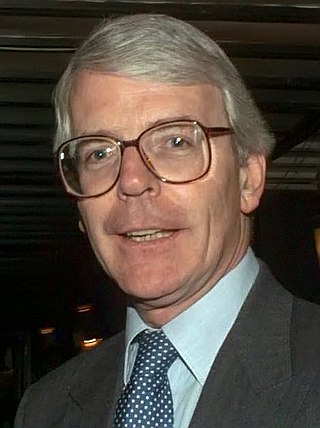
The 1997 Dissolution Honours List was gazetted on 18 April 1997 following the advice of the outgoing Prime Minister, John Major. The only honours in this list were 21 life peerages.

The 1983 Dissolution Honours List was gazetted on 21 July 1983 following the advice of the Prime Minister, Margaret Thatcher.

The 1987 Dissolution Honours List was gazetted on 30 July 1987 following the advice of the Prime Minister, Margaret Thatcher.
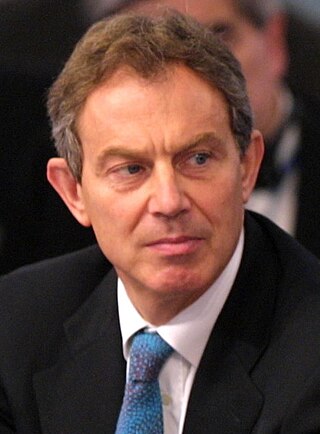
The 2001 Dissolution Honours List was gazetted on 2 June 2001 prior to the General Election of the same year by the Prime Minister, Tony Blair.

The 2005 Dissolution Honours List was issued after the General Election of the same year on the advice of the Prime Minister, Tony Blair.
The frontbench of His Majesty's Loyal Opposition in the Parliament of the United Kingdom consists of the Shadow Cabinet and other official shadow ministers of the political party currently serving as the Official Opposition. The Opposition front bench provide Parliamentary opposition to the British Government front bench, and is currently the Labour Party led by Keir Starmer since April 2020.